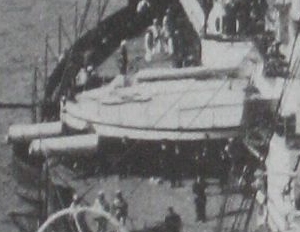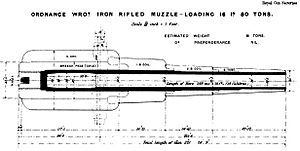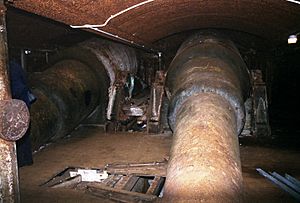RML 16-inch 80-ton gun facts for kids
Quick facts for kids Ordnance RML 16-inch 80-ton gun |
|
|---|---|

Left side/front turret on HMS Inflexible
|
|
| Type | Naval gun |
| Place of origin | United Kingdom |
| Service history | |
| In service | 1880–1902 |
| Used by | Royal Navy |
| Wars | Bombardment of Alexandria (1882) |
| Production history | |
| Designer | Royal Gun Factory |
| Designed | 1874 |
| Manufacturer | Royal Arsenal |
| Unit cost | £10,000 |
| No. built | 8 |
| Variants | Mk I |
| Specifications | |
| Barrel length | 288 inches (7.3 m) (bore) |
|
|
|
| Shell | 1,684 pounds (763.8 kg) Palliser, common, Shrapnel |
| Calibre | 16-inch (406.4 mm) |
| Muzzle velocity | 1,590 feet per second (480 m/s) |
| Maximum firing range | 8,000 yards (7,300 m) |
The RML 16-inch 80-ton gun was a very large gun used on warships. It was a muzzle-loading gun, meaning it was loaded from the front. These powerful guns were made to help British battleships match the strength of large ships from Italy and France in the 1870s.
Contents
What Was the 80-Ton Gun?
The RML 16-inch 80-ton gun was a huge weapon. It was designed to be one of the most powerful guns at sea. The "RML" in its name stands for "Rifled Muzzle-Loading." This means the inside of the gun barrel had spiral grooves. These grooves made the cannonball spin, helping it fly straighter and hit targets more accurately.
How Was the 80-Ton Gun Built?
The gun was made from strong materials to handle its power. It had an inner tube made of tough mild steel. Around this tube were many layers of wrought-iron coils. These coils, along with a special breech-piece and a jacket, made the gun very strong.
The spiral grooves inside the barrel were called "polygroove rifling." There were 33 of these grooves. They started straight and slowly twisted more towards the end of the barrel. This twist helped the cannonball spin perfectly as it left the gun.
When Was This Gun Used?
The design of this gun started in 1873. After many tests, the warship HMS Inflexible was the only ship to use these guns. It had four of them installed in 1880.
However, by the time these guns were ready, new technology was already appearing. Guns that loaded from the front (muzzle-loaders) were becoming old-fashioned. Newer guns that loaded from the back (called breechloading guns) were much faster and safer to use.
Besides the Inflexible, two more of these 80-ton guns were placed on land. They were used for coastal defense at the Admiralty Pier Turret in Dover, England. They helped protect the coast from enemy ships.
What Kind of Ammunition Did It Use?
This gun used a special type of ammunition. Because of its polygroove rifling, it fired cannonballs that did not have studs (small bumps) on them. Instead, it used something called "automatic gas-checks." These gas-checks helped the cannonball spin correctly as it traveled down the barrel.
Where Can You See These Guns Today?
Today, only two of these massive 80-ton guns still exist. You can find them at the Admiralty Pier Turret in Dover, Kent, UK. They are part of the ruins there, showing a piece of naval history.
See also
- List of naval guns
Images for kids
 | Shirley Ann Jackson |
 | Garett Morgan |
 | J. Ernest Wilkins Jr. |
 | Elijah McCoy |




